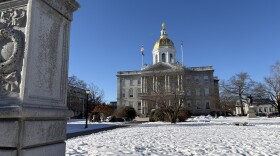Northern Pass interveners and opponents, Eversource staff, and lawyers - many lawyers - gathered in a big, rented room with custard-colored walls. And that’s where they will be every day until these hearings end, weeks from now.
Marty Honigberg, chairman of the Public Utilities Commission acknowledged the sprawl of this case at the hearings’ start.
“Normally at these things the chair reads from a memorandum that summarizes all that’s happened to get us to the point where we are at the beginning of the adjudicative hearings. We will not be reading that from that because it will take us all day – and everyone knows why we are here.”
The first witness at this hearing was a crucial one, Eversource’s New Hampshire President William Quinlan. For Quinlan, this day was divisible into two distinct parts. It opened with questions from two friendly interveners, the City of Berlin, and the electricians union. Both hope to benefit from Northern Pass’s promise of jobs, and that showed in the questioning.
"For the record, I’m Alan Raff representing the International Brotherhood of Electrical Workers. Thanks for coming Mr. Quinlan. Just some questions on jobs from the start. In your pre-file testimony dated October 16, 2015, you states that the project would create thousands of jobs. Is that correct?"
"Yes. That’s correct, yes. Approximately 2600 is our estimate," Quinlan responded.
"Thank you."
When it was Public counsel Tom Pappas’s turn with Quinlan, the tone was less friendly. Pappas challenged Quinlan in areas ranging from line burial.

"It is technologically feasible to construct the entire route underground? Is that right?"
"Yes that is correct."
Pappas also pressed Quinlan on Northern Pass’s timing in spreading money around the North Country – some in the form of donations, but also in the case of the Balsams resort, which backs the project, a loan.
"And are you aware that five days later, after the Balsams petitioned to intervene in this proceeding, February 10th, 2016, is when Eversource wired the two million dollars to the Balsams?"
"No. I’m not aware of date of the wiring."
How any of this may factor into the ruling of the site evaluation committee isn’t knowable. The committee’s job is to make sure Northern Pass has the capacity – financial and technical – to pull off the project. The committee is also charged with making sure projects don’t interfere with regional development or have “an unreasonable adverse affect” on aesthetics, historic sites, the natural environment and public health and safety.
These standards have been tweaked during the the years Northern Pass has been under debate. The economy and energy market have changed too; when the project was proposed during the pit of the recession the promise of jobs was probably more potent than it is today. But during the same time period, more power plants have gone offline, which to backers of the project underscore its need.
Yet competing projects to import Candadian hydro-power into New England have also emerged.
Jack Savage of the Society for the Protection of New Hampshire Forests, a group that’s helped lead the fight against Northern Pass, says the battle over this project may seem entrenched, but this SEC hearing, regardless of final outcome, gives all sides an opportunity they’ve yet to have.
"We have finally come to a point where witnesses like Mr. Quinlan are under oath, and the interveners, where you are for the project or against the project, are like the counsel for the public. Trying to understand the truth behind the project, you can not only get an answer under oath, you can get a follow up question. And that’s an important part of it for the seven SEC members who have to ultimately make a decision."
That decision is a long ways off. First it will be weeks more testimony.








